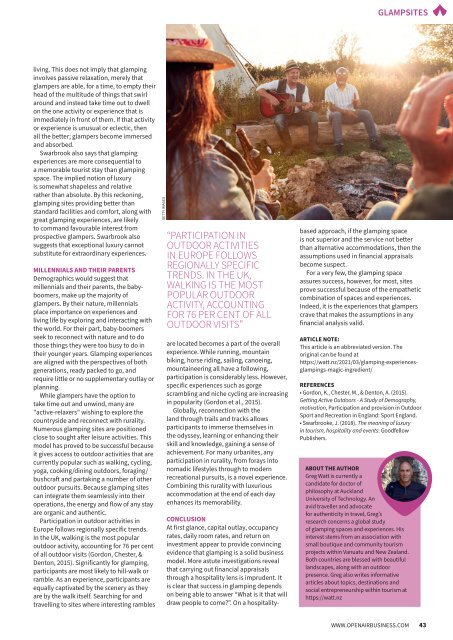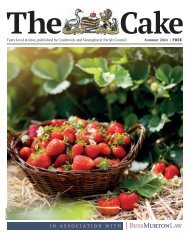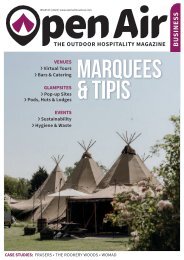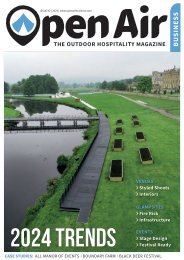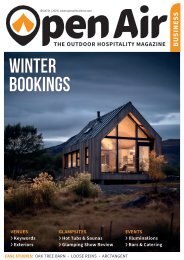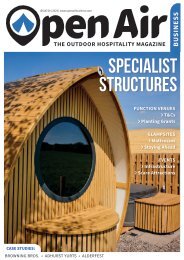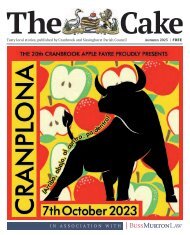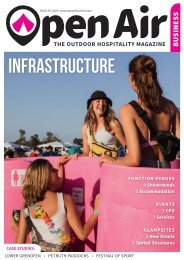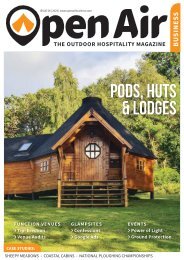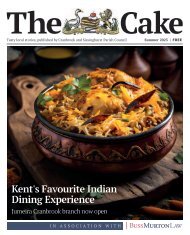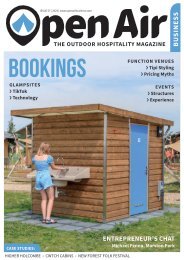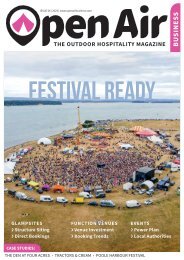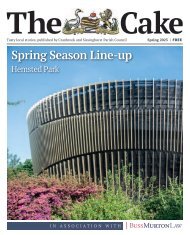March/April 2021
The UK's outdoor hospitality business magazine for function venues, glamping, festivals and outdoor events
The UK's outdoor hospitality business magazine for function venues, glamping, festivals and outdoor events
You also want an ePaper? Increase the reach of your titles
YUMPU automatically turns print PDFs into web optimized ePapers that Google loves.
GLAMPSITES<br />
living. This does not imply that glamping<br />
involves passive relaxation, merely that<br />
glampers are able, for a time, to empty their<br />
head of the multitude of things that swirl<br />
around and instead take time out to dwell<br />
on the one activity or experience that is<br />
immediately in front of them. If that activity<br />
or experience is unusual or eclectic, then<br />
all the better; glampers become immersed<br />
and absorbed.<br />
Swarbrook also says that glamping<br />
experiences are more consequential to<br />
a memorable tourist stay than glamping<br />
space. The implied notion of luxury<br />
is somewhat shapeless and relative<br />
rather than absolute. By this reckoning,<br />
glamping sites providing better than<br />
standard facilities and comfort, along with<br />
great glamping experiences, are likely<br />
to command favourable interest from<br />
prospective glampers. Swarbrook also<br />
suggests that exceptional luxury cannot<br />
substitute for extraordinary experiences.<br />
MILLENNIALS AND THEIR PARENTS<br />
Demographics would suggest that<br />
millennials and their parents, the babyboomers,<br />
make up the majority of<br />
glampers. By their nature, millennials<br />
place importance on experiences and<br />
living life by exploring and interacting with<br />
the world. For their part, baby-boomers<br />
seek to reconnect with nature and to do<br />
those things they were too busy to do in<br />
their younger years. Glamping experiences<br />
are aligned with the perspectives of both<br />
generations, ready packed to go, and<br />
require little or no supplementary outlay or<br />
planning.<br />
While glampers have the option to<br />
take time out and unwind, many are<br />
"active-relaxers" wishing to explore the<br />
countryside and reconnect with rurality.<br />
Numerous glamping sites are positioned<br />
close to sought after leisure activities. This<br />
model has proved to be successful because<br />
it gives access to outdoor activities that are<br />
currently popular such as walking, cycling,<br />
yoga, cooking/dining outdoors, foraging/<br />
bushcraft and partaking a number of other<br />
outdoor pursuits. Because glamping sites<br />
can integrate them seamlessly into their<br />
operations, the energy and flow of any stay<br />
are organic and authentic.<br />
Participation in outdoor activities in<br />
Europe follows regionally specific trends.<br />
In the UK, walking is the most popular<br />
outdoor activity, accounting for 76 per cent<br />
of all outdoor visits (Gordon, Chester, &<br />
Denton, 2015). Significantly for glamping,<br />
participants are most likely to hill-walk or<br />
ramble. As an experience, participants are<br />
equally captivated by the scenery as they<br />
are by the walk itself. Searching for and<br />
travelling to sites where interesting rambles<br />
GETTY IMAGES<br />
“PARTICIPATION IN<br />
OUTDOOR ACTIVITIES<br />
IN EUROPE FOLLOWS<br />
REGIONALLY SPECIFIC<br />
TRENDS. IN THE UK,<br />
WALKING IS THE MOST<br />
POPULAR OUTDOOR<br />
ACTIVITY, ACCOUNTING<br />
FOR 76 PER CENT OF ALL<br />
OUTDOOR VISITS”<br />
are located becomes a part of the overall<br />
experience. While running, mountain<br />
biking, horse riding, sailing, canoeing,<br />
mountaineering all have a following,<br />
participation is considerably less. However,<br />
specific experiences such as gorge<br />
scrambling and niche cycling are increasing<br />
in popularity (Gordon et al., 2015).<br />
Globally, reconnection with the<br />
land through trails and tracks allows<br />
participants to immerse themselves in<br />
the odyssey, learning or enhancing their<br />
skill and knowledge, gaining a sense of<br />
achievement. For many urbanites, any<br />
participation in rurality, from forays into<br />
nomadic lifestyles through to modern<br />
recreational pursuits, is a novel experience.<br />
Combining this rurality with luxurious<br />
accommodation at the end of each day<br />
enhances its memorability.<br />
CONCLUSION<br />
At first glance, capital outlay, occupancy<br />
rates, daily room rates, and return on<br />
investment appear to provide convincing<br />
evidence that glamping is a solid business<br />
model. More astute investigations reveal<br />
that carrying out financial appraisals<br />
through a hospitality lens is imprudent. It<br />
is clear that success in glamping depends<br />
on being able to answer “What is it that will<br />
draw people to come?”. On a hospitalitybased<br />
approach, if the glamping space<br />
is not superior and the service not better<br />
than alternative accommodations, then the<br />
assumptions used in financial appraisals<br />
become suspect.<br />
For a very few, the glamping space<br />
assures success, however, for most, sites<br />
prove successful because of the empathetic<br />
combination of spaces and experiences.<br />
Indeed, it is the experiences that glampers<br />
crave that makes the assumptions in any<br />
financial analysis valid.<br />
ARTICLE NOTE:<br />
This article is an abbreviated version. The<br />
original can be found at<br />
https://watt.nz/<strong>2021</strong>/03/glamping-experiencesglampings-magic-ingredient/<br />
REFERENCES<br />
• Gordon, K., Chester, M., & Denton, A. (2015).<br />
Getting Active Outdoors - A Study of Demography,<br />
motivation, Participation and provision in Outdoor<br />
Sport and Recreation in England: Sport England.<br />
• Swarbrooke, J. (2018). The meaning of luxury<br />
in tourism, hospitality and events: Goodfellow<br />
Publishers.<br />
ABOUT THE AUTHOR<br />
Greg Watt is currently a<br />
candidate for doctor of<br />
philosophy at Auckland<br />
University of Technology. An<br />
avid traveller and advocate<br />
for authenticity in travel, Greg’s<br />
research concerns a global study<br />
of glamping spaces and experiences. His<br />
interest stems from an association with<br />
small boutique and community tourism<br />
projects within Vanuatu and New Zealand.<br />
Both countries are blessed with beautiful<br />
landscapes, along with an outdoor<br />
presence. Greg also writes informative<br />
articles about topics, destinations and<br />
social entrepreneurship within tourism at<br />
https://watt.nz<br />
WWW.OPENAIRBUSINESS.COM 43


